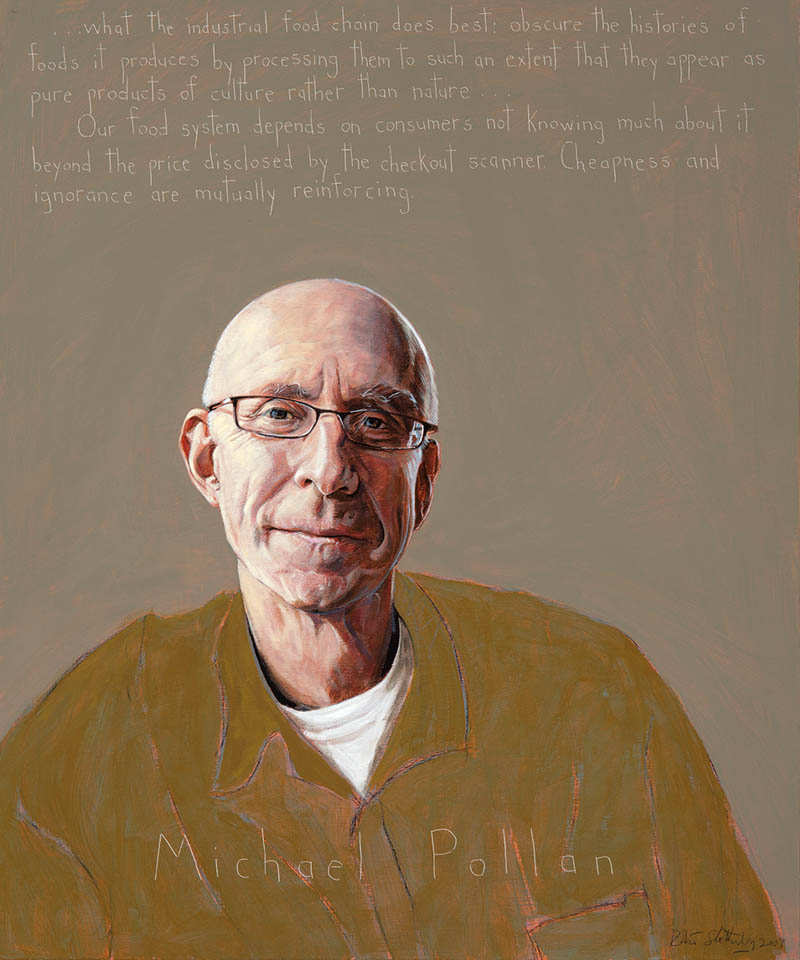
Michael Pollan
Journalist, Professor : b. 1955
“…what the industrial food chain does best: obscure the histories of foods it produces by processing them to such an extent that they appear as pure products of culture rather than nature… Our food system depends on consumers not knowing much about it beyond the price disclosed by the checkout scanner. Cheapness and ignorance are mutually reinforcing.”
Biography
Michael Pollan is changing the way Americans think about food. Most of his books and articles investigate the perils of the industrial food chain—and the benefits and pleasures of freeing ourselves from it.
“[T]he way we eat represents our most profound engagement with the natural world,” Pollan wrote in The Omnivore’s Dilemma: A Natural History of Four Meals (2006). In the book, he traced four food chains—industrial, big organic, local farm, and hunter-gatherer—to examine how what we eat affects our health and the health of the environment.
Pollan warns that industrial farming has grown detached from the ecological cycles of nature, with grave consequences. He illustrates this by tracing the origins of a fast food meal to the mass production of cheap corn, which relies on genetic engineering and massive amounts of chemical pesticides and fertilizers. Industrial corn is fed to cows and other animals on factory farms, which treat animals inhumanely, pollute the environment and contribute to drug-resistant bacteria through overuse of antibiotics. This same corn is used to produce high fructose corn syrup, a ubiquitous sweetener that has been linked with obesity, Type II diabetes and other health problems.
In addition to critiquing agribusiness, Pollan also investigates alternatives. He writes, in the Omnivore’s Dilemma, about Joel Salatin’s Polyface Farms as a model of sustainable farming. Pollan concludes his investigation into the ethics, philosophy, economics and psychology of eating by hunting and gathering his own meal.
The Omnivore’s Dilemma spurred a national conversation about how Americans eat. In response, Pollan wrote In Defense of Food: An Eater’s Manifesto (2008), in which he observes that a mainstay of the American diet is not real food, but “edible food-like substances” manufactured and promoted by what he calls “the Nutritional Industrial Complex.” Pollan challenges “nutritionism” as an ideology that endangers our health and points out that Americans have grown sicker and fatter in spite of several decades of expert nutritional advice. Instead, he advises rather than obsessing about nutrients, to eat only unprocessed, well-grown foods that our great-grandparents would have recognized. One line from the book has become a mantra for healthy eating: “Eat Food. Not too much. Mostly plants.”
Pollan has become a leading advocate for reforming the nation’s agricultural policies. In October 2008, he published an open letter to the “Farmer-in-Chief” in The New York Times Magazine urging the new President to make comprehensive food system reform a top priority of the new administration. “[U]nless you do, you will not be able to make significant progress on the health care crisis, energy independence or climate change,” Pollan wrote. “[T]he way we currently grow, process, and eat food in America goes to the heart of all three problems and will have to change if we hope to solve them.”
A contributing writer for The New York Times and a former executive editor for Harper’s Magazine, Pollan wrote three books before The Omnivore´s Dilemma: Second Nature: A Gardener’s Education (1991), A Place of My Own (1997) and The Botany of Desire: A Plant’s-Eye View of the World (2001). Most of his books and articles examine the relationships between humans and nature.
Pollan was born in Long Island, New York, to parents who are both writers. His mother, Corky, is a columnist and his father, Stephen, is an author and financial consultant. Pollan received a B.A. from Bennington College and an M.A. in English from Columbia University. He is married to the landscape painter Judith Belzer and is a professor of journalism at the University of California at Berkeley.
Programs
Americans Who Tell the Truth (AWTT) offers a variety of ways to engage with its portraits and portrait subjects. Host an exhibit, use our free lesson plans and educational programs, or engage with a member of the AWTT team or portrait subjects.

Education
AWTT has educational materials and lesson plans that ask students to grapple with truth, justice, and freedom.

Exhibits & Community Engagement
AWTT encourages community engagement programs and exhibits accompanied by public events that stimulate dialogue around citizenship, education, and activism.